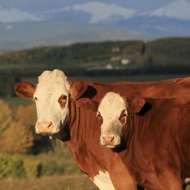
Model suggests a greater focus on cattle is the most effective way to control the disease
Researchers from the University of Warwick have produced the first national model to investigate the spread of bovine TB.
The study demonstrates that the majority of herd outbreaks are caused by multiple transmission routes - including failed cattle infection tests, cattle movement and reinfection from environmental reservoirs. The work suggests that improved cattle testing, vaccination of cattle and culling all cattle on infected farms would be the most effective strategies for controlling the disease.
Based on a study of cattle and the causes of bTB in Great Britain, the model sought to ascertain how and why the epidemic has grown over the past 15 years. Using data from the AHVLA and Defra, the researchers developed a mathematical model that incorporated both within-farm and between-farm bTB transmission.
The model proposes that whilst badgers form part of the environmental reservoir they only play a relatively minor role in the transmission of infection.
"Our model offers a dispassionate, unbiased view of the spread of bTB through the cattle industry of Great Britain,” says model co-author Professor Matthew Keeling, from Warwick’s School of Life Sciences and Department of Mathematics.
“The model is based on the recorded pattern of positive and negative tests and uses the known movement of cattle around the country. We aim for it to provide policy-makers with the best evidence possible from which to make decisions relating to bTB and to contribute to the ongoing discussions on this sensitive issue”.
The researchers argue that the findings are essential for improving the targeting control measures. If infected farms can be identified and caught early then it might be possible to make substantial progress in tackling the epidemic.
For further information on the University of Warwick's bovine TB research please visit www.warwick.ac.uk/WIDER/activities/bTB.



 The Veterinary Medicines Directorate (VMD) is inviting applications from veterinary students to attend a one-week extramural studies (EMS) placement in July 2026.
The Veterinary Medicines Directorate (VMD) is inviting applications from veterinary students to attend a one-week extramural studies (EMS) placement in July 2026.